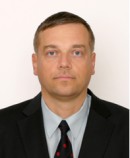|
Plenary
Lecture
Applications of the Concept of Virtual Organization in
Military Training

Professor Mircea Boşcoianu
“Henri Coandă” Air Force Academy Braşov
ROMANIA
E-mail:
prorector_cercetare@afahc.ro
Abstract: Multi-Agent System (MAS) is defined as a
group of agents with specific roles in the organization
which work in a synergic way (the global contribution
represents more then the summarization of the
contribution of the components). In real world there is
an interest to be oriented on networks, based on a
dynamic and adaptive process of selection of the
abilities and capabilities of different actors and then
fused in a single entity (chain value concept).
This application is inspired from the distributive
business process (DBP) concept which represents a set of
dynamic/temporary processes orientated on developing the
final product of Virtual Enterprise (VE). The VE is
defined (Camarinha-Mathos, Afsarmanessh,1999) as a
“temporary alliance that come together to share skills
or core competencies and resources in order to better
respond to business opportunities, and who’s cooperation
is supported by computer networks”. The key elements are
networking and cooperation. A generalized concept of VE
is represented by Virtual Organization (VO) which
represents collaborative networks of organizations that
are not limited by Enterprises.
This application is based on the concept of MAS-VE which
is designed and developed by using a proper mechanism to
sustain VO based on the cooperation in networks of chain
values.
The architecture (the functional structure defined by
taking into the elements of the system interface,
processes, constrains and behavior) of VO is
characterized by a minimal structural definition, but
also by the complexity of tasks and restrictions of the
processes.
MAS-VO should satisfy a demand with maximal efficiency.
The flexibility is expressed by the capability to offer
a wide variety of different configurations. More
flexibility implies a better management of change by
using local decisions and then a parallel dissemination
on the whole system.
Military training should consider a multi environment
space, in which the virtual component of training should
respond to: increased capabilities, embedded and
tactical subsystems, joint capabilities. The advantage
of a training support infrastructure based on virtual
components is expressed by costs, efficiencies, better
adaptability, a unique capability of battle staffs to
synchronized. The concept of synthetic training
environment and embedded training based on virtual
training systems support commanders requirements for
more efficient training.
In this paper are also presented the emerging
possibilities to improve combat skills and leadership
formation for military students by using virtual based
techniques capable to simulate the complexity of future
battle space.
Brief Biography of the Speaker:
Mircea Boscoianu born at 29.04.1966 in Suceava, Romania.
He is a Romanian citizen that graduated the Faculty of
Integrated System of Armament, Aerospace Engineering in
the Military Technical Academy of Bucharest (1990) and
the Faculty of Cybernetics in the Academy of Economic
Studies of Bucharest (1996). His first PhD was in
Aerospace Engineering (1993-1999) in Military Technical
Academy and the second in Cybernetics and Statistics
(2000-2003) in the Academy of Economic Studies of
Bucharest.
Since 2009 he is vice-rector of Science at Air Force
Academy Brasov.
His research and teaching activities (1990-2009,
Military Technical Academy, Dept of Integrated
Aeronautical System and Mechanics, 2009-2012 Air Force
Academy Brasov) covered an extended area of Aerospace
Engineering, Cybernetics, Statistics and
interdisciplinary domain like mini and micro, Risk
Management, Management of Extreme Risk Events, Soft
Computing, Artificial Intelligence . He is author/
co-author of more than 120 published papers and has
contributed to more than 15 books in these fields.
Mircea Boscoianu has 12 participations in WSEAS
Conferences with 20 papers. He was the Head of
Saphire-FAI Program (2006-2008) and is member of the
Astronautical Commision of the Romanian Academy since
2005.
Mircea Boscoianu has an interesting experience in
national projects/ programs (5 projects in CNCSIS
2003,CEEX 2005,SECURITY 2005,PN2 2007 as general manager
and many projects as scientifical economical manager).
|
